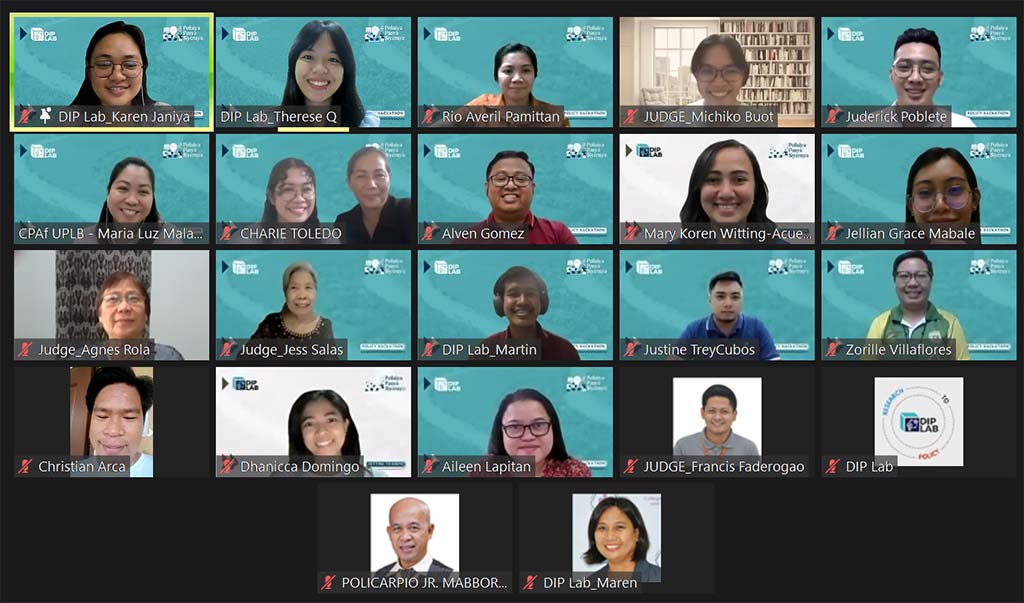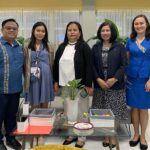In a resounding sequel to their groundbreaking initiative, the Development Innovations and Policy Laboratory (DIP Lab) conducted its second installment of the policy hackathon under the theme “Polisiya, Pasya, SIyensya: Major River Basins of the Philippines”. From November 24 to December 14, 2023, the event zeroed in on tackling and addressing critical issues surrounding the river basins in the country.
Four State Colleges and Universities (SUCs) namely, Cagayan State University, Central Luzon State University, Northern Bukidnon State College, and West Visayas State University joined the policy hackathon. The 15 participants composed of a dynamic blend of educators, researchers, and local government representatives synergized their expertise in crafting policy briefs, fostering a collaborative approach to navigating the complexities of river basin management.
The virtual policy hackathon opened with a series of pre-events specifically designed to capacitate and prepare the participants for the policy hackathon proper. The first pre-event is an engaging ‘Getting to know and Appreciating each other’ session led by Assistant Professor and former DIP Lab Project member, Dr. Monica H. Walet of UP Manila. This session not only offered the participants a unique opportunity to cultivate teamwork, but also provided a platform to strategize for effective collaboration and advocacy. Dr. Walet emphasized nurturing trust and communication, encouraging participants to leverage each other’s strengths as they approach the policy hackathon proper.
The second pre-event came in the form of a webinar titled “Rippling Insights: A webinar on Philippine River Basins”. The knowledge-rich session featured esteemed experts on river basins and watersheds, namely Dr. Agnes C. Rola, Academician of the National Academy of Science and Technology, and Professor Emeritus of the College of Public Affairs and Development; and Dr. Jessica C. Salas of the Philippine Watershed Management Coalition. The resource speakers shared the status and challenges of the country’s major river basins, which served as a foundation for the participants in identifying the main problems and key insights for their policy briefs.
For the final pre-event titled “Building on the problems”, the DIP Lab team conducted a short lecture and workshop on problem structuring with DIP Lab project leader Dr. Aileen V. Lapitan and DIP Lab Project Staff Karen S. Janiya serving as resource persons. This activity allowed participants to further formalize their problems and craft doable and practical recommendations prior to the main policy hackathon event.
After three weeks of preparations in the form of the pre-events, the Policy Hackathon proper commenced with a short lecture on policy brief writing and packaging delivered by DIP Lab Project Staff Therese Marie L. Quilnat. The rest of the day was then devoted to writing the respective policy briefs of the teams; time was also allotted for consultations with the panel of experts who will also serve as the judges of the event.
The Cagayan State University team focused on the increased soil erodibility due to poor watershed management and land conversion in the Pinacanauan de Tuguegarao Watershed. According to them, ground assessment and a review of the Cagayan Valley Flood Mitigation Master Plan is needed to implement nature-based approaches to resolve soil erosion.
The team from Central Luzon State University emphasized the need for extensive stakeholder participation in the Pantabangan-Carranglan watershed. They proposed to strengthen collaborative engagements among Pantabangan-Carranglan stakeholders to secure the ecological health and resources of the watershed.
The third team from Northern Bukidnon State College pitched their policy brief titled “Rivers on the Mend: Sustainable Solutions to Elevated Organic Pollutants in Tagoloan River Basin.” They explored the implications of high Biological Oxygen Demand, emphasizing the need for comprehensive management aligned with sustainable development goals particularly SDG 6 on Clean Water and Sanitation.
Lastly, Team West Visayas State University highlighted the need for joint efforts by the Local Government Units (LGUs), River Basin Management Council, and other stakeholders to assess, plan for, and rehabilitate the riparian zone in the Jalaur River Basin.
The policy briefs were evaluated using the following criteria: clarity, feasibility, effectiveness, sustainability, delivery and presentation, and layout. Participating judges for the hackathon were the two resource speakers Dr. Agnes C. Rola and Dr. Jessica C. Salas, as well as CPAf’s in-house experts, University Researchers Francis F. Faderogao and Michiko Karissa M. Buot.
Northern Bukidnon State College emerged as the first place winner of the DIP Lab Policy Hackathon 2.0 receiving a prize worth PHP 20,000 while West Visayas State University and Central Luzon State University got the second (PHP 15,000) and third place (PHP 10,000), respectively. The winning outputs will be repackaged into DIP Lab Policy briefs.
This policy hackathon is one of the activities of DIP Lab. Similar to the hackathon code fests of the STEM field, the activity involves creative problem-solving where the goal is not merely to discuss or dissect problems, but to engage in a collaborative investigation of various challenges from diverse perspectives, with the ultimate aim of uncovering innovative and effective solutions.
To know more about DIP Lab’s activities, visit its official website, Facebook, Twitter (X), and LinkedIn page.

Martin Advincula
-
Martin Advincula#molongui-disabled-link



